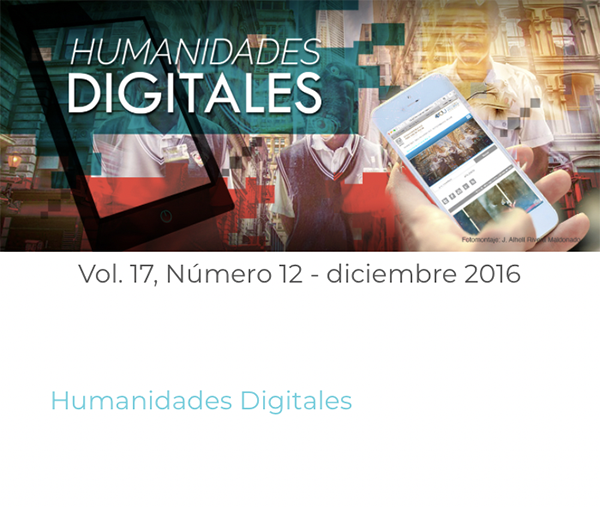Renewing the dissemination of calls for papers and conferences on antiquity: Fasti Congressuum, a proposal from the digital humanities
Keywords:
Antique, Fasti Congressuum, call for papers, Digital Humanities, congresses, diffusionAbstract
The lack of communication between institutions and countries affects the dissemination and internationalization of researchers' work. Fasti Congressuum was created to address this problem. It is an international project whose objective is the free dissemination of calls for papers and conferences on Antiquity. The project's foundation is the use of Digital Humanities, social media, and all the new tools that allow us to create an effective, instant, and global dissemination network for scientific events on Antiquity. This article presents the Fasti Congressuum project from its inception, the results achieved, the growth experienced in just a year and a half, and the project's acceptance in the academic world.
References
DUCE Pastor, E.; ESCÁMEZ De Vera, D.M., et al. “Fasti Congressuum. A useful online tool for congress and call for papers”, Handbook of Research on Emerging Technologies for Cultural Heritage, eds. Alfonso IPPOLITO y Michela CIGOLA, Hershey, IGI Global, 2016, pp. 26-44.
FORCADA, M.L. “¿Cómo se escriben y se publican trabajos de investigación?” [en línea], Publicación online vinculada al Máster de Gestión de la Educación de la Universidad de Alicante, 2001. http://www.dlsi.ua.es/~mlf/ceptc/notas.html [Consulta:4 octubre 2016].
GONZÁLEZ, G. “Cómo la ciencia está usando las redes sociales para la investigación”, Blogthining, 24 de Agosto de 2016, http://blogthinkbig.com/como-la- ciencia-esta- usando-las- redes-sociales-para-la- investigacion/
RUIZ SANTOS, C.; MEROÑO-CEDÁN, A.L. “Utilidad de los congresos científicos en la difusión del conocimiento: percepción del investigador español en Economía de la Empresa”. Técnica Administrativa, 2007. [en línea]. [Consulta: 4 octubre 2016]. Disponible en : http://www.cyta.com.ar/ta0602/v6n2a1.htm
TORRES-SALINAS, D.; DELGADO-LÓPEZ-CÓZAR, E., “Estrategia para mejorar la difusión de los resultados de investigación con la Web 2.0”. El profesional de la información, septiembre-octubre de 2009, v. 18, n.5. [en línea]. [Consulta: 14 octubre 2016], http://eprints.rclis.org/13901/
Academia.edu, 2008. [en línea]. [Fecha de consulta: 14 octubre 2006] Disponible en: https://www.academia.edu/
Agade mail list, n.d. [en línea]. 30 de septiembre de 2016. [Fecha de consulta: 14 octubre 2016]. Disponible en: http://ancientworldonline.blogspot.com.es/2013/04/agade-mailing-list-archive-on-twitter.html ISSN 2156-2253
Archport Mail List. 2015. [en línea] [Fecha de consulta: 15 octubre 2016]. Disponible en: http://ml.ci.uc.pt/mhonarchive/archport/index.html
Classical Association of the Atlantic States, n.d. [en línea]. [Fecha de consulta: 13 octubre 2016]. Disponible en: http://caas-cw.org/wp/
CLASSICISTS Mail List, n.d. [en linea]. [Fecha de consulta: 13 octubre 2016]. Disponible en: http://listserv.liv.ac.uk/cgi-bin/wa?A0=CLASSICIST
Loop, 2007. [en línea]. [Fecha de consulta: 15 octubre 2016]. Disponible en: http://loop.frontiersin.org/about
Research Gate, 2008. [en línea]. [Fecha de consulta: 14 octubre 2016]. Disponible en: https://www.researchgate.net/
Fasti Congressuum. @fasticongress 2006. [Tuit]. https://twitter.com/fasticongress [consulta: 13 octubre 2016]
Res_Australes. @Res_Australes. [Tuit]. https://twitter.com/res_australes?lang=es
Rogueclassicist. @Rogueclassicist. [Tuit]. https://twitter.com/rogueclassicist?lang=es
The Classical Assoc. @Classical_Assoc. [Tuit]. https://twitter.com/Classical_Assoc?lang=es
Wix.com, n.d. [en línea] .[Fecha de consulta: 20 octubre 2016] Disponible en: www.wix.com
Published
Issue
Section
License
Copyright (c) 2017 Revista Digital Universitaria

This work is licensed under a Creative Commons Attribution-NonCommercial-ShareAlike 4.0 International License.

Revista Digital Universitaria es editada por la Universidad Nacional Autónoma de México se distribuye bajo una Licencia Creative Commons Atribución-NoComercial 4.0 Internacional. Basada en una obra en http://revista.unam.mx/.






